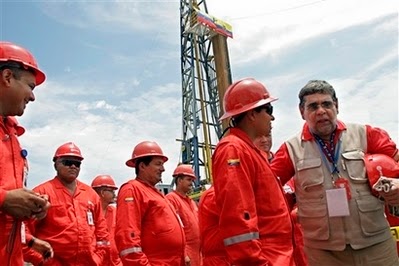 |
| Not just oil workers but comrades in arms. |
Top officials from major oil producers Venezuela and Saudi Arabia held a rare bilateral meeting Wednesday as OPEC member countries grapple with a continuing price slump. Venezuelan Foreign Minister Rafael Ramirez, who until recently was head of state energy giant Petróleos de Venezuela, or PdVSA, and is the country’s OPEC representative—and Saudi Oil Minister Ali al-Naimi usually meet at scheduled gatherings. But the two convened on the sidelines of a climate conference on the Venezuelan resort island of Margarita in a sign of the pressure building up on the Organization of the Petroleum Exporting Countries amid crude oil’s price drop of more than 25% since the summer.Here we have a game-theoretic example of how a "sock it to the weakest link" strategy will pan out. Instead of investing proceeds when oil prices were high in improving production facilities and hence output--even with the help of (heaven forbid) foreigners--Venezuela has unwisely chosen to divert proceeds into all sorts of pseudo-socialist projects like funding an uncompetitive Formula One driver. Venezuela is an inefficient and therefore high-cost producer whose breakeven price for extraction is of a magnitude higher than Saudi Arabia's. The latter prefers to wait it out; can US shale producers with their newfangled techniques sustain themselves at these lower prices levels? The Saudis don't think so and are prepared to duke it out. Meanwhile, Venezuela is literally bankrupting itself at these selfsame levels:
The two countries hold opposing attitudes toward the price slump. Venezuela’s public finances are reliant on high prices while the Saudis are reluctant to take steps to support prices by cutting its oil output. This week, Saudi Arabia lowered the price for crude sold to the U.S.—a move seen to maintain its market share for exports to the country.
During past oil-price slumps, the group has acted collectively to rein in production to support prices. This time, its influence over the market has become limited because much of the oil flooding markets comes from booming shale-oil production in the U.S. that is beyond the group’s control. That has effectively left OPEC members reluctant to cut their output in an increasingly competitive environment.While the analogy is imperfect, think of Germany and Greece in the EU. The threshold for a strong euro currency is much higher for Germany than it is for the 50-pound weakling of EMU economies, Greece. Saudi Arabia has an ulterior motive of testing the waters of American extractive efficiency. It is leaving Venezuela high and dry by making the excuse that the supply boom is due to a producer outside the cartel, but a true cartel would not just stand around and do nothing. Also see Daniel Yergin on this matter.
“Al-Naimi is going to explain to Ramirez that not much can be done at the moment and it is a cycle the market is going through,” said another Saudi official. Of the OPEC members, Venezuela has been the most vocal about the rapid slide in oil prices since June. Last month, it made an unheeded call for an emergency meeting of the group.
Even before prices plummeted in the summer, Venezuela was confronted with a weak economy. The steep price drop in the commodity that makes up to 96% of the Venezuela’s export revenue has compounded its economic challenges. President Nicolás Maduro has seen his popularity plummet to a record low, according to polls, as dollar shortages have led to a precipitous decline in the value of the local bolívar currency and contributed to scarcities of food and consumer goods.
Even among would-be oligopolists, there are power games afoot.

